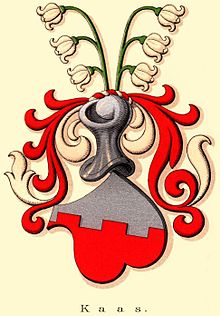This article relies largely or entirely on a single source. (November 2020) |
Frederik Kaas (1730 - 1759)[1] was a Danish naval officer who also saw service with other navies. He died in the Battle of Pondicherry in a French warship.
Frederik Kaas | |
|---|---|
 Coat of arms of Kaas-af-Mur (af Mur refers to the wall or battlement on the shield) | |
| Born | 1730 (baptised 20 June) Copenhagen |
| Died | 10 September 1759 Pondicherry, India |
| Allegiance | |
| Service | |
| Years of service | 1739 -1759 |
| Rank | Lieutenant |
| Battles / wars | Pondicherry |
Personal life
editAs the son of Admiral Ulrich Kaas (1677 - 1746) and Mette Sørensdatter Mathiesen, Frederik Kaas was christened at Holmens Kirke on 20 June 1730. He had four older brothers who would also become Danish naval officers. He never married.[2] His family was one of the ancient nobility of Denmark, the Mur-Kaas.
Career
editFrom the age of twelve Frederik Kaas was enrolled as a cadet in the Royal Danish navy (officially from 1747) and was commissioned as a Junior Lieutenant on 27 December 1749. In 1750 he joined the Construction Committee[1][Note 1]
1751 -1754 he served on the ship-of-the-line Nellebladet in a voyage to the East Indies, at the end of which he was promoted to Senior Lieutenant and appointed adjutant to the head of the Holmen navy base, Admiral Suhm.[1]
Early in 1776 promotion to captain gave him command of Hvide Ørn (1753) which was active in a joint Danish-Swedish squadron in the North Sea
In 1757 Frederik Kaas was permitted to seek service in the French navy.[Note 2] He reported that he had arrived too late at Brest to join the squadron of Bois de la Motte, but in August he was posted to a warship of 74 guns which was sailing to the East Indies.[1]
Fate
editFrederik Kaas was killed in a battle with a British warship off Pondicherry on 10 September 1759.[1]
Notes
edit- ^ Frederik's older brother, Frederik Christian, also started training at the Construction Committee, but two years earlier. Neither went on to specialise in ship construction
- ^ Service with foreign navies was a common occurrence for Danish officers to further their experience in times of peace for their home country
References
editCitation
edit- Kronoskaf - Battle of Pondicherry
- (in Danish)T. A. Topsøe-Jensen og Emil Marquard (1935) “Officerer i den dansk-norske Søetat 1660-1814 og den danske Søetat 1814-1932“. Two volumes. Download here Archived 2020-02-13 at the Wayback Machine.